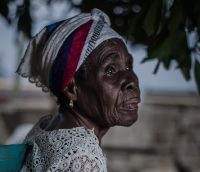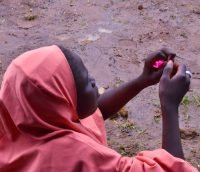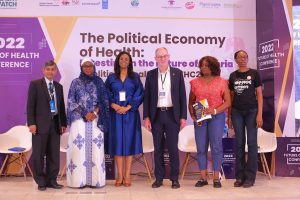 |
| Group photo after the second-panel session at the Future of Health Conference in Abuja. Image Credit: Nigeria Health Watch |
by Adetayo Adetokun
The Future of Health Conference is an annual conference hosted by Nigeria Health Watch. The conference aims to provide a visible platform for critical stakeholders in healthcare, finance, politics, and other allied sectors to discuss the factors that influence Nigeria’s health policies; how political, social, and economic factors shape individual and population health outcomes; health service development within the economic and political context; and how to create a national health service that meets the needs of all Nigerians.
The 2022 theme was “The Political Economy of Health: Investing in Nigeria’s Future”. We attended the conference and shared crucial discussions about health and the investments in this sector that are required to improve the overall health, well-being, and productivity of Nigerians.
We believe that healthcare is a human right, and everyone should have access to good healthcare and universal coverage. We also recognize the role good healthcare plays in the development of African communities. The government of every country has a huge role to play in ensuring that every citizen of their country has access to good healthcare.
This conference allowed us to improve our knowledge of ways to reduce the number of deaths in the communities that are hardly reached with quality and sustainable healthcare. This conference also spotlighted one of the main issues we are committed to ending – maternal and pediatric health. In many communities, women and children are often at the bottom of the economic chain, and it is difficult for them to access the healthcare services they require.
There were so many moments at the conference that resonated with our work and the actions we hoped to take.
Welcome Address
 |
| Vivianne Ihekweazu, Managing Director of Nigeria Health Watch Image Credit: Nigeria Health Watch |
The welcome address was delivered by Vivianne Ihekweazu, the Managing Director of Nigeria Health Watch. In her address, she stated that the Future of Health conference was started to reinforce the importance of universal health coverage. She mentioned the importance of government and political leaders’ intervention in the healthcare ecosystem. She reminded citizens that we are saddled with the responsibility of ensuring our political leaders are held accountable for the availability of healthcare infrastructure and its proper management.
Keynote Speech
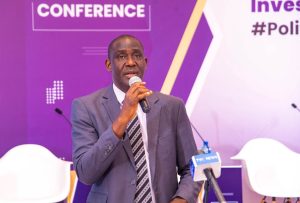 |
| Professor Olumide Ayodele during his keynote speech. Image Credit: Nigeria Health Watch |
The keynote speech was delivered by Professor Olumide Ayodele on behalf of Ben Akawueze, the Managing Director of the Budget Office of the Federal Government of Nigeria.
He spoke about the importance of monitoring the financial expenditure allocated to each government project. “It is not the amount of money that is being spent. But, its impact”, he said. He expounded on the importance of advocacy in the healthcare financing sector and why we need more people to look into how budgets are allocated and utilized.
On healthcare financing, he emphasized that it is the responsibility of both government and sub-national entities to ensure that healthcare is financed, as the government can only finance some of the healthcare projects due to the low revenue generated.
After this keynote session, there were three-panel sessions:
The Economy of Health — the economic cost of poor health prioritization and the economic benefits of prioritizing health
Politics and Health — charting a course of action to set Nigeria on course for achieving UHC.
Political Leadership in Health — the impact of leadership on healthcare at the sub-national level.
First-panel session: The Economy of Health — the economic cost of poor health prioritization and the economic benefits of prioritizing health.
The first-panel session had Prof. Obinna Onwujekwe, a Member of the European Commission-funded Eval-Health project fr. Sarah Alade, Special Adviser to the Nigerian President on Finance and Economy; Dr. Onoriode Ezire, Se; or Health Specialist, at World Bank Nigeria; Dr. Ola Brown, Founder, Flying Doctors Incorporated; and Dr. Habib Sadauki, National President, Society of Gynaecology and Obstetrics, Nigeria.
 |
| Dr. Ola Brown making her points during the first-panel session. Image Credit: Nigeria Health Watch |
Dr. Ola Brown spoke about why young people leave the country in their thousands. She said the lack of good healthcare infrastructure and viable opportunities, as well as the persistent insecurity in the country, were some of the reasons young people left the country. She believes that when healthcare problems in Nigeria are solved, all other problems will be easily solved.
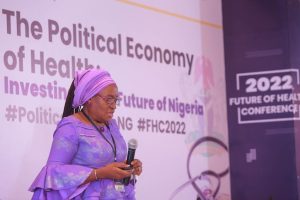 |
| Dr. Sarah Alade making her points during the first-panel session. Image Credit: Nigeria Health Watch |
Dr. Sarah Alade pointed out that healthcare is a pillar for development in every country, and we cannot mention healthcare without considering sustainable development goals. She hopes the government and private entities will continue to donate to healthcare development in the coming years.
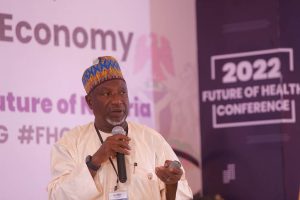 |
| Dr. Habib Sadauki sharing his thoughts during the first-panel session. Image Credit: Nigeria Health Watch |
Dr. Habib Sadauki articulated the importance of investing in family planning and women’s health in general. He said that the low rate of accessibility to family planning for Nigerian women has affected our economy greatly as many families continue to give birth to more children than they can cater for. “For every dollar invested in family planning, there is a return of three dollars.” This has been proven across many countries and regions.
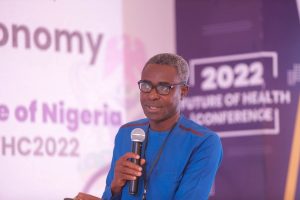 |
| Dr. Onoriode Ezire sharing his thoughts during the first-panel session. Image Credit: Nigeria Health Watch |
Dr. Onoriode Ezire called the audience to reflect on the deplorable state of healthcare in Nigeria. He said the reason we have very terrible healthcare can easily be traced to the low Gross Domestic Product in Nigeria, which is one of the lowest in Africa. “Due to this low GDP, Nigeria has one of the highest mortality rates in Africa.” He emphasized that the best way to improve healthcare in Nigeria is to ensure that all hands are on deck.
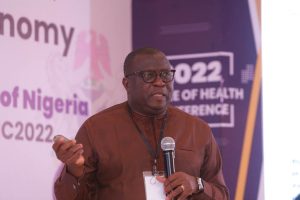 |
| Prof. Obinna Onwujekwe sharing his thoughts during the first-panel session. Image Credit: Nigeria Health Watch |
Prof. Obinna Onwujekwe spoke about the importance of an immaculate system of governance where everything is plain and fair so citizens can adequately monitor the activities of the government and its financial expenditures.
The Second Panel Session: Politics and Health — charting a course of action to set Nigeria on course for achieving Universal Health Coverage.
The second-panel session had Rob Yates of Chatham House Centre for Universal Healthcare, Dr. Amina Aminu Dorayi, Country Director of Pathfinder International; Amarakoon Bandara, Senior Economic Advisor, United Nations Development Program (UNDP) Nigeria; and Yemi Adamolekun, Executive director at Enough is Enough Nigeria. It was facilitated by Akinuwa Akin.
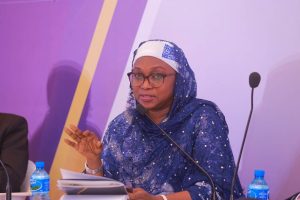 |
| Dr. Amina Aminu Dorayi sharing her thoughts during the second panel session. Image Credit: Nigeria Health Watch |
Dr. Amina Aminu Dorayi expressed the importance of learning from other governments and systems that have been able to restructure their healthcare in the past. We should partner with such governments and ensure we critically look at what they have done and see if it would also work for us as a country.
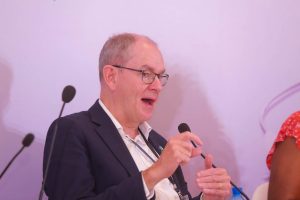 |
| Yates Rob sharing his thoughts during the second panel session. Image Credit: Nigeria Health Watch |
Yates Rob reflected on the importance of universal health coverage. This is something that can be done in a very short time, especially when there is a crisis or pandemic. If universal health coverage can be done in a short period due to pandemics, then we should look into making it work permanently across all sectors of health. He further stated that universal health coverage will create an avenue for the removal of healthcare subsidies in a very short period.
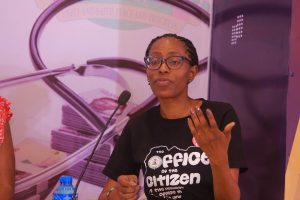 |
| Yemi Adamolekun sharing her thoughts during the second panel session. Image Credit: Nigeria Health Watch |
Yemi Adamolekun spoke about leadership in the healthcare ecosystem. She expressed that funding is not our problem per se but the ability to have a courageous vision from our leaders to connect the dots between the problems we have and how to solve them. People are not moved by what they hear but by what they see, so we need to start working to prove how important our healthcare leadership is.
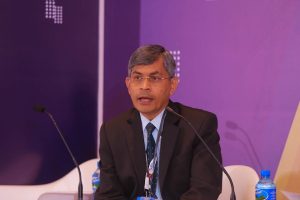 |
| Amarakoon Bandara sharing his thoughts during the second panel session. Image Credit: Nigeria Health Watch |
Amarakoon Bandara reflected on how the pandemic affected healthcare in Nigeria. He said before the pandemic, the government did not have enough facilities to prepare them for such occurrences. He further stated that, as a country, we need to start partnerships to ensure a strong healthcare system.
The third-panel session: “Political Leadership in Health — the impact of leadership on health care at the sub-national level.”
The third and final session constituted of Dr. Amina Baloni, Commissioner for Health in Kaduna State; Dr. Oyebanji Filani, Commissioner for Health, Ekiti State; Dr. Betta Edu, Former Commissioner for Health, Cross River State; Dr. Obi Emmanuel Ikechukwu, Commissioner for Health, Enugu State; and Dr. Habu Dahiru, Commissioner for Health, Gombe State.
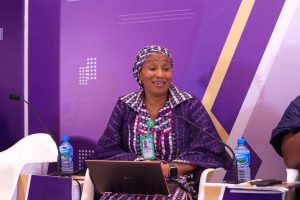 |
| Dr. Amina Mohammed Baloni sharing her thoughts during the third-panel session. Image Credit: Nigeria Health Watch |
Dr. Amina Mohammed Baloni spoke about the importance of data in the healthcare sector. Data can help us plan accordingly and know the next steps to take. Nigeria already has several healthcare policies, but we do not seek to be implementing them as we should
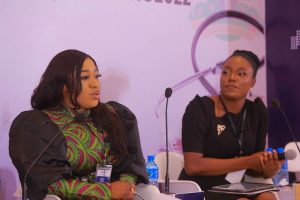 |
| Dr. Betta Edu sharing her thoughts during the third panel session. Image Credit: Nigeria Health Watch |
Dr. Betta Edu focused on healthcare providers and why it is important to start treating healthcare matters the way our politicians treat them. “We must shift healthcare insurance from voluntary to mandatory too to achieve universal healthcare coverage.”
 |
| Dr. Oyebanji Filani making his points during the third panel session. Image Credit: Nigeria Health Watch |
Dr. Oyebanji Filani reiterates that the health status of the people living in a community is very important. When people are healthy, they are productive, and only then can they actively contribute to society.
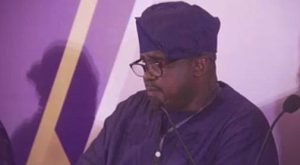 |
| Dr. Obi Emmanuel Okechukwu making his points during the third panel session. Image Credit: Nigeria Health Watch |
Dr. Obi Emmanuel Okechukwu stated that we should always sit together and map out what communication experts call the Single Overriding Communication Objective (SOCO). He also said that the more people we can have in healthcare insurance, the more revenue the government can generate.
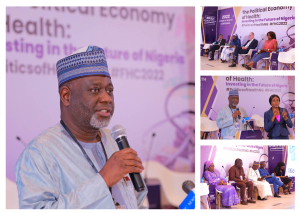 |
More photos from the Future of Health Conference in Abuja. Image Credit: Nigeria Health Watch |
At the end of this conference, we were reminded just how much lies on us – all of us – to dissect the healthcare problems in Nigeria today. Some of the most important takeaways were the role of financial endowments in improving the healthcare sector; ensuring that universal health coverage is not just parroting catchphrases but actually ensuring everyone is covered; the unequivocal role transparency plays in funding and finance; and the need for private entities to take up the position of investors in healthcare.
We will play our bit and hold the government accountable by using storytelling to bring to the fore the issues that cripple our healthcare systems and ways things can be better.



